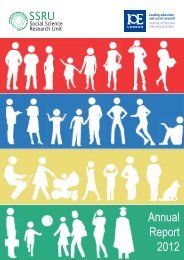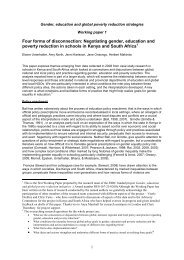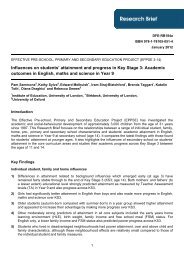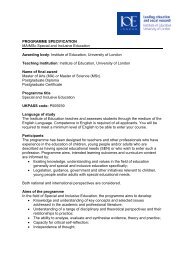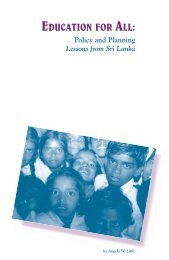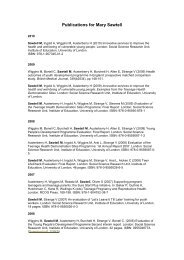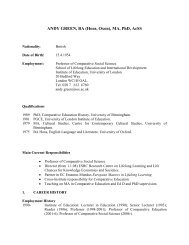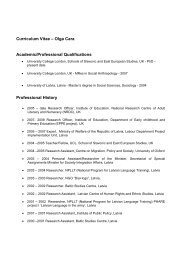1 Girls; running the world or growing up too fast? - Institute of ...
1 Girls; running the world or growing up too fast? - Institute of ...
1 Girls; running the world or growing up too fast? - Institute of ...
You also want an ePaper? Increase the reach of your titles
YUMPU automatically turns print PDFs into web optimized ePapers that Google loves.
<strong>Girls</strong>; <strong>running</strong> <strong>the</strong> <strong>w<strong>or</strong>ld</strong> <strong>or</strong> <strong>growing</strong> <strong>up</strong> <strong>too</strong> <strong>fast</strong>?<br />
Dr Julia Dane<br />
Abstract<br />
Popular female artists today perf<strong>or</strong>m a femininity which is ‘feminine and feminist at <strong>the</strong> same time,<br />
merging notions <strong>of</strong> personal agency with <strong>the</strong> visual display <strong>of</strong> sexuality’ (Genz, 2010:106). Sexuality has<br />
become linked to empowerment producing a pluralistic, paradoxical postfeminist position’ (ibid).<br />
Jocelyn Vena <strong>of</strong> MTV News f<strong>or</strong> example, described Beyoncé’s Run The W<strong>or</strong>ld (<strong>Girls</strong>) (Nash et al, 2011) as<br />
a "female empowerment/girl power type <strong>of</strong> song"( 12th April, 2011). This, I argue, is highly debatable.<br />
In 2010, a Daily Mail headline read; ‘How raunchy Lady Gaga and Co make girls grow <strong>up</strong> <strong>too</strong> soon’<br />
(Williams, 16th April), echoing <strong>the</strong>ir 2003 headline, ‘Raunchy pop stars accused <strong>of</strong> depriving girls <strong>of</strong> <strong>the</strong>ir<br />
innocence’ (Harris, 30th July). The recent Bailey Review published by <strong>the</strong> Department <strong>of</strong> Education<br />
(2011) recommended placing age restrictions on music videos and covering <strong>up</strong> sexualized images on<br />
<strong>the</strong> front pages <strong>of</strong> magazines and newspapers. Framed this way, both perspectives position girls as<br />
passive in <strong>the</strong>ir negotiation <strong>of</strong> music video. Noticeably absent in this debate is <strong>the</strong> voice <strong>of</strong> girls<br />
<strong>the</strong>mselves. This paper will draw on qualitative data collected through girls talking about music video,<br />
to interrogate how girls understand and negotiate contemp<strong>or</strong>ary discourses <strong>of</strong> femininity. The girls’ talk<br />
articulates <strong>the</strong>ir strategies <strong>of</strong> negotiation in terms <strong>of</strong> m<strong>or</strong>al concerns f<strong>or</strong> younger girls, <strong>the</strong> changing<br />
expectations <strong>of</strong> boys, <strong>the</strong> loss <strong>of</strong> a ‘natural’ femininity, and <strong>the</strong> loss <strong>of</strong> female solidarity expressed<br />
through <strong>the</strong>ir nostalgia f<strong>or</strong> girl power.<br />
Key w<strong>or</strong>ds<br />
girls, sexualization, innocence, music video, postfeminism<br />
1
Introduction<br />
Beyoncé’s Run <strong>the</strong> W<strong>or</strong>ld (<strong>Girls</strong>) is described as a "female empowerment/girl power type <strong>of</strong><br />
song“(Jocelyn Vena, MTV News 12.4.2011). Popular female artists today perf<strong>or</strong>m a femininity which is<br />
‘feminine and feminist at <strong>the</strong> same time, merging notions <strong>of</strong> personal agency with <strong>the</strong> visual display <strong>of</strong><br />
sexuality’ with sexuality now ‘linked to empowerment producing a pluralistic, paradoxical postfeminist<br />
position’ (Genz 2010:106)<br />
The counter to this argument is provided by institutions such as government, media and parent gro<strong>up</strong>s<br />
such as mumsnet. The following headlines are taken from <strong>the</strong> UK paper <strong>the</strong> Daily Mail.<br />
2<br />
• ‘Raunchy pop stars accused <strong>of</strong> depriving girls <strong>of</strong> <strong>the</strong>ir innocence” (Harris, 30.7.2003)<br />
• ‘How raunchy Lady Gaga and Co make girls grow <strong>up</strong> <strong>too</strong> soon’ (Williams, 16.4.2010)<br />
• ‘Not family viewing: Raunchy music videos by <strong>the</strong> likes <strong>of</strong> Rihanna and Christina Aguilera set to<br />
be banned bef<strong>or</strong>e 9pm’ (Shipman 3.6.2011)<br />
• 'Music videos are <strong>too</strong> sexual': X Fact<strong>or</strong> judge Gary Barlow hits out at pop stars' explicit promos’<br />
(Neville, 23.11.2011)<br />
Government rhet<strong>or</strong>ic is also inf<strong>or</strong>med by this perspective, with <strong>the</strong> UK Department <strong>of</strong> Education<br />
publishing ‘Letting children be children; <strong>the</strong> rep<strong>or</strong>t <strong>of</strong> an independent review <strong>of</strong> <strong>the</strong> commercialisation
and sexualisation <strong>of</strong> childhood’ (Bailey 6.6.2011). The expressed fears <strong>of</strong> ‘premature sexualization’ relate<br />
to a perceived loss <strong>of</strong> innocence with <strong>the</strong> focus firmly on female sexual development. It is pertinent to<br />
cite Walkerdine in this respect:<br />
“It is <strong>the</strong> girl as erotic object that threatens <strong>the</strong> innocence <strong>of</strong> <strong>the</strong> rational child, f<strong>or</strong> it is she who seems to<br />
threaten <strong>the</strong> idea <strong>of</strong> childhood as separate from adulthood, who by her presence seems to be<br />
contaminating <strong>the</strong> very idea <strong>of</strong> childhood, and must be kept at bay at all costs.” (Walkerdine, 1997, p.<br />
18)<br />
In this way a paradoxical position is produced which on <strong>the</strong> one hand presents sexuality and sexual<br />
perf<strong>or</strong>mance as empowerment, whilst on <strong>the</strong> o<strong>the</strong>r reproduces m<strong>or</strong>e traditional m<strong>or</strong>al discourses<br />
(panics) and regulat<strong>or</strong>y practices regarding <strong>the</strong> sexuality <strong>of</strong> girls. No longer child, but not yet adult, girls<br />
become <strong>the</strong> subject <strong>of</strong> regulat<strong>or</strong>y practices which are particularly inf<strong>or</strong>med by <strong>the</strong> intersection <strong>of</strong><br />
discourses <strong>of</strong> childhood and <strong>of</strong> femininity. This paper interrogates <strong>the</strong> ways in which girls <strong>the</strong>mselves<br />
construct and negotiate <strong>the</strong>se contradict<strong>or</strong>y positions.<br />
This paper draws <strong>up</strong>on qualitative data collected through girls talking about music video, to interrogate<br />
how girls understand and negotiate contemp<strong>or</strong>ary discourses <strong>of</strong> femininity. The research is based on<br />
my PhD <strong>the</strong>sis, entitled ‘<strong>Girls</strong>’ talk; new femininities; old m<strong>or</strong>alities’. The term ‘new femininities,’ here<br />
represents an academic construct <strong>of</strong> a shift from patriarchal femininities founded in traditional<br />
m<strong>or</strong>alities, to new discourses <strong>of</strong> femininity in terms <strong>of</strong> freedom and choice (McRobbie, 1999)<br />
Method<br />
To expl<strong>or</strong>e girls’ engagements with discourses <strong>of</strong> new femininities, a series <strong>of</strong> focus gro<strong>up</strong>s were<br />
conducted with girls aged thirteen and fourteen. Nine focus gro<strong>up</strong>s were conducted with a total <strong>of</strong> fifty<br />
four year nine girls interviewed. Five sessions were conducted at a coeducational school and four in an<br />
all girls’ school. Focus gro<strong>up</strong>s can help to address power dynamics and encourage participants to talk to<br />
each o<strong>the</strong>r as well as <strong>the</strong> interviewer. Meanings are brought to <strong>the</strong> discussion by <strong>the</strong> participants, who<br />
are encouraged to elab<strong>or</strong>ate, allowing conversations to develop between participants which are useful<br />
in analysis. The aim <strong>of</strong> <strong>the</strong> focus gro<strong>up</strong> is to create an environment which allows “participants to<br />
generate <strong>the</strong>ir own questions, frames and concepts, pursue <strong>the</strong>ir own pri<strong>or</strong>ities on <strong>the</strong>ir own terms, in<br />
<strong>the</strong>ir own vocabulary” (Barbour and Kitzenger, 1999:5). Using music videos as a visual representation <strong>of</strong><br />
<strong>the</strong> research question prompted discussion in <strong>the</strong>ir own terms.<br />
The focus gro<strong>up</strong>s each produced transcripts which include <strong>the</strong> voices <strong>of</strong> between five and seven girls,<br />
with seven <strong>of</strong> <strong>the</strong> nine gro<strong>up</strong>s containing six participants. Coates’ (1996) study <strong>of</strong> conversation among<br />
female friends produced transcripts which closely resemble those obtained here. Coates rec<strong>or</strong>ded and<br />
transcribed female friends in conversation across a period <strong>of</strong> five years. Her transcripts showed how<br />
female friends converse and build narratives through linguistic parallels, that is how <strong>the</strong>y mirr<strong>or</strong> each<br />
o<strong>the</strong>r and collab<strong>or</strong>ate in conversation. Where in conversation analysis, <strong>the</strong> linguistic devices <strong>of</strong> “turntaking”<br />
and “st<strong>or</strong>y telling” are considered, Coates draws on <strong>the</strong> w<strong>or</strong>k <strong>of</strong> Carole Edelsky (1993:189) to<br />
3
argue that female talk is produced in terms <strong>of</strong> a collab<strong>or</strong>ative flo<strong>or</strong>. Within <strong>the</strong> collab<strong>or</strong>ative flo<strong>or</strong>,<br />
through interr<strong>up</strong>tion and overlapping talk, discussions progress in a particular way to produce a gro<strong>up</strong><br />
voice. F<strong>or</strong> Coates, <strong>the</strong> production <strong>of</strong> a collab<strong>or</strong>ative flo<strong>or</strong> is a linguistic device which constitutes and<br />
maintains female friendship.<br />
In 2004, when <strong>the</strong> initial research was conducted, artists such as Christina Aguilera and Beyoncé<br />
epitomized <strong>the</strong> successful, independent and sexy post-feminist woman.<br />
One video screened in <strong>the</strong> sessions was Beyoncé’s (2004) Naughty Girl.<br />
With <strong>the</strong> aim to interrogate <strong>the</strong> girls’ construct and understanding <strong>of</strong> discourses <strong>of</strong> female<br />
empowerment linked to sexualised perf<strong>or</strong>mance, I ask if Beyoncé represents girl power to <strong>the</strong>m. The<br />
following is an excerpt from <strong>the</strong> girls’ talk in response to my question.<br />
jd: Destiny’s Child sung <strong>the</strong> “Independent Woman” song would you say that was a kind <strong>of</strong> girl power?<br />
4
(some mms, 4 nods)<br />
Katy: yeah<br />
jd: do you think she still represents that?<br />
(.1) (thoughtful pause)<br />
Stacey: not on her own=<br />
Katy: =no not on her own<br />
(Ella shakes head)<br />
Stacey: she’s got a load <strong>of</strong> blokes in her videos<br />
The muted response tells me that my assumption <strong>of</strong> an association between female independence and<br />
girl power is not shared by <strong>the</strong> girls. In this discussion, Ella challenges <strong>the</strong> idea that Beyoncé represents<br />
girl power saying she is trying to make her self “look sexy f<strong>or</strong> men”:<br />
Helen: see how much sh<strong>or</strong>ter her skirts can be<br />
(all laugh loudly)<br />
Helen: on her video its m<strong>or</strong>e m<strong>or</strong>e legs out<br />
Throughout all sessions, <strong>the</strong> girls talk about Beyoncé makes a distinction between her as solo artist and<br />
as member <strong>of</strong> <strong>the</strong> three girl gro<strong>up</strong>, Destiny’s Child. In <strong>the</strong> above excerpts, <strong>the</strong> girls are producing a<br />
collab<strong>or</strong>ative flo<strong>or</strong> to explain that Beyoncé does not represent girl power on her own, <strong>or</strong> with ‘loads <strong>of</strong><br />
blokes’. I <strong>the</strong>ref<strong>or</strong>e rephrase my question in terms <strong>of</strong> girl power, which produces a narrative <strong>of</strong><br />
friendship:<br />
Katy: <strong>the</strong>re’s not much girl power now cos em (.) not (.) many (.) like (.2) like <strong>the</strong> Spice <strong>Girls</strong> you don’t see<br />
many friends like that now<br />
jd: no?<br />
Katy “even <strong>the</strong> Spice <strong>Girls</strong> aren’t even mates now”<br />
Here <strong>the</strong> girls are expressing nostalgia f<strong>or</strong> a loss <strong>of</strong> representation <strong>of</strong> female friendship and solidarity.<br />
From this we can deduce that f<strong>or</strong> <strong>the</strong>se girls, girl power does not represent <strong>the</strong> right to female desire<br />
and independence, but female friendship and solidarity, as a narrative <strong>of</strong> perf<strong>or</strong>mance “f<strong>or</strong> men” as not<br />
5
girl power emerges. This is fur<strong>the</strong>r underpinned by <strong>the</strong> common narrative <strong>of</strong> OTT (over <strong>the</strong> top) as an<br />
excessive feminine perf<strong>or</strong>mance. The point <strong>of</strong> excess is founded in a distinction between perf<strong>or</strong>mance<br />
f<strong>or</strong> self and perf<strong>or</strong>mance f<strong>or</strong> men. This is encapsulated in <strong>the</strong> following quote:<br />
Roshan: “I think girls are selling <strong>the</strong>ir bodies really. They’re selling <strong>the</strong>ir bodies f<strong>or</strong> fame and money.<br />
That’s kind <strong>of</strong> disgusting if you think about it like that cos <strong>the</strong>y are selling <strong>the</strong>ir body to male people all<br />
over <strong>the</strong> place and everything and all that f<strong>or</strong> money. I think it’s not w<strong>or</strong>th it. Cos it’s selling your self<br />
discipline, self respect”<br />
Fur<strong>the</strong>r, <strong>the</strong> girls produce hierarchies <strong>of</strong> innocence which are based <strong>up</strong>on sexual knowledge and<br />
reproduce <strong>the</strong> premature sexualization discourse. This is expressed as <strong>the</strong> need to “protect” younger<br />
girls. In this research, <strong>the</strong> 13 and 14 year old girls positioned <strong>the</strong>mselves through discourses <strong>of</strong> m<strong>or</strong>ality,<br />
with <strong>the</strong> understanding that sexual knowledge is c<strong>or</strong>r<strong>up</strong>ting to <strong>the</strong> sanitized space <strong>of</strong> childhood<br />
(Walkerdine, 1997). As <strong>the</strong> following excerpt demonstrates, <strong>the</strong> girls demarcate a difference between<br />
<strong>the</strong>mselves and “little” girls through sexual knowledge.<br />
Lana: I’m s<strong>or</strong>ry but like my little cousin she’s in nursery and she’s got a boyfriend<br />
(all laugh and smile)<br />
Sarah: oh I think that’s [really sweet<br />
Lana: [think that’s sweet like she runs <strong>up</strong> to him she runs <strong>up</strong> to him she (.) can I have a<br />
kiss<br />
Sarah: yeah (nodding and smiling)<br />
Lana: he goes mwah (kissing sound) and <strong>the</strong>n like my o<strong>the</strong>r cousin Tessy her name is yeah she goes erm<br />
(laughs) my boyfriend<br />
Sarah: oh I like that name<br />
Lana: licked me today I went what<br />
(all laugh)<br />
Lana: and she goes he licked my cheek (points to face) I went oh that’s naughty Tess<br />
(much laughing from all)<br />
By telling this st<strong>or</strong>y Lana makes a distinction between <strong>the</strong> “innocence” <strong>of</strong> asexual childhood<br />
relationships and m<strong>or</strong>e “knowing” physical sexual relationships. The distinction is emphasized through<br />
<strong>the</strong> use <strong>of</strong> <strong>the</strong> terms “sweet” and “little” which invoke <strong>the</strong> concept <strong>of</strong> innocence. The st<strong>or</strong>y <strong>the</strong>n<br />
functions to differentiate <strong>the</strong>se early teen girls from younger girls through sexual knowledge.<br />
6
The issue <strong>of</strong> age and m<strong>or</strong>al policing is fur<strong>the</strong>r highlighted in <strong>the</strong> following excerpt:<br />
Ge<strong>or</strong>gina: “yeah like little kids and <strong>the</strong>y’re like (.) Mum what’s that?”<br />
Rachel: “like I think <strong>the</strong> JoJo video I think that’s a bit much because eh little girls are going to be watching<br />
that and it’s gonna be like encouraging <strong>the</strong>m to get boyfriends”<br />
The discourse <strong>of</strong> naturalised male sexual behaviour (“boys will be boys”), inf<strong>or</strong>ms how <strong>the</strong> girls<br />
understand music video address to <strong>the</strong> audience. They make a distinction between videos f<strong>or</strong> boys, and<br />
videos f<strong>or</strong> girls defining “dirty” music videos as produced f<strong>or</strong> a male gaze which is identified through<br />
female perf<strong>or</strong>mance which draws on <strong>the</strong> codes <strong>of</strong> s<strong>of</strong>t p<strong>or</strong>n, videos where women are “wet and halfnaked”.<br />
The girls identify <strong>the</strong> need to contain natural male discourse:<br />
Helen: “I think girls tart <strong>up</strong> that’s why I don’t get hurt because I don’t tart <strong>up</strong> if girls tart <strong>up</strong> <strong>the</strong>n men (.)<br />
know that <strong>the</strong>y’re easy”<br />
In ano<strong>the</strong>r session, Nicole complains that boys are always saying “really dirty” things to <strong>the</strong>m.<br />
Natalie: <strong>the</strong>y’re trying to make us to be like <strong>the</strong>m<br />
Jd: do you think<br />
Natalie: mm<br />
Dina: and <strong>the</strong>n <strong>the</strong>y expect some m<strong>or</strong>e from us from us to be like that<br />
In this way <strong>the</strong> girls express a disidentification with music video address which presents sexualized<br />
perf<strong>or</strong>mance as empowerment. Indeed <strong>the</strong>y frame such videos as problematic.<br />
Conclusion<br />
Drawing on <strong>the</strong> girls’ talk, <strong>the</strong> question <strong>of</strong> how do girls negotiate contradict<strong>or</strong>y positions in relation to<br />
female sexuality and empowerment can be summed <strong>up</strong> as follows. Adult associations <strong>of</strong> sexualised<br />
perf<strong>or</strong>mance and empowerment are not necessarily shared by <strong>the</strong> girls who are <strong>the</strong> target audience <strong>of</strong><br />
music videos. F<strong>or</strong> <strong>the</strong>se girls, music videos now highlight an absence <strong>of</strong> girl power in terms <strong>of</strong> female<br />
friendship and solidarity. Fur<strong>the</strong>r, <strong>the</strong> girls rearticulate m<strong>or</strong>al concerns f<strong>or</strong> younger girls through a<br />
potential loss <strong>of</strong> childhood innocence inf<strong>or</strong>med by a definition <strong>of</strong> OTT sexual perf<strong>or</strong>mance f<strong>or</strong> men.<br />
Despite government and media concerns, <strong>the</strong>y express a recognition <strong>of</strong> a demand to imitate and a<br />
disidentification with <strong>the</strong> hypersexualised representations <strong>of</strong> music video address. To conclude, it is<br />
clear that f<strong>or</strong> <strong>the</strong>se girls, sexualised female perf<strong>or</strong>mance and empowerment represented by artists such<br />
as Beyoncé are not evidence that girls rule <strong>the</strong> <strong>w<strong>or</strong>ld</strong>. Ra<strong>the</strong>r, as sadly expressed by Roshan (age 13);<br />
‘basically it’s a man’s <strong>w<strong>or</strong>ld</strong> isn’t it’.<br />
7
Bibliography<br />
Barbour, R.S. and Kitzenger, J. (eds) (1999) Developing Focus Gro<strong>up</strong> Research: Politics, The<strong>or</strong>y and<br />
Practice Sage Publications Ltd. London<br />
Coates, J. (1996) Women’s Talk Blackwell Publishers Ltd. UK<br />
Edelsky, C. “Who’s Got <strong>the</strong> Flo<strong>or</strong>?” in Tannen, D. (ed) (1993) Gender and Conversational Interaction.<br />
Oxf<strong>or</strong>d University Press Inc. New Y<strong>or</strong>k<br />
Genz, S (2010) Singled Out: Postfeminism’s “New Woman” and <strong>the</strong> Dilemma <strong>of</strong> Having It All Journal <strong>of</strong><br />
Popular Culture Vol. 43 No.1<br />
Harris, S. Raunchy pop stars accused <strong>of</strong> depriving girls <strong>of</strong> <strong>the</strong>ir innocence. Daily Mail (July 30th 2003)<br />
McRobbie, A. (1999) In <strong>the</strong> Culture Society: Art, Fashion and Popular Music Routledge, London<br />
Nash, Terrius, Knowles, Beyoncé, van de Wall, Nick, Pentz, Wesley, Tayl<strong>or</strong>, David, Palmer, Adidja (2011)<br />
Run <strong>the</strong> W<strong>or</strong>ld (<strong>Girls</strong>) Sony Music Entertainment<br />
Walkerdine, V. (1997) Daddy’s Girl Harvard University Press, Massachusetts.<br />
Williams, R. Too much, <strong>too</strong> young? Retailers still selling over-sexualized clothing to kids Guardian (April<br />
16th 2010)<br />
http://www.mtv.com/news/articles/1661774/Beyoncé-roberto-cavalli-new-music-video.jhtml 12th April<br />
2011<br />
Department <strong>of</strong> Education Letting children be children; <strong>the</strong> rep<strong>or</strong>t <strong>of</strong> an independent review <strong>of</strong> <strong>the</strong><br />
commercialisation and sexualisation <strong>of</strong> childhood’ (6.6.2011).<br />
8



